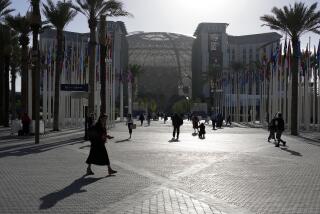Next Step : Yeltsin’s ‘Round Table’ Plan May Be Last Soviet Hope : The proposal, accepted by Gorbachev, has quickly come into vogue. It brings optimism for consensus as a way out of the nation’s crisis.
- Share via
MOSCOW — In the Soviet Union’s ever-darkening nightmare of economic collapse and political disintegration, suddenly there is new hope for a consensus that could pull the country out of its crisis.
As proposed by Boris N. Yeltsin, the Russian populist, and accepted in principle by President Mikhail S. Gorbachev, the country’s top political leaders would gather at a “round table” to thrash out solutions to its problems and then commit themselves to carrying them out.
Gone would be the posturing, bickering and feuding that constitute much of Soviet politics today; instead, the focus would be on action programs that all could accept and that would win the support of the country.
The character and shape of this new forum are still being debated for it would constitute a fundamental shift away from the Communist Party’s control of the central government toward the first real sharing of power since Gorbachev insisted that the party give up its monopoly on decision making.
An initial effort late last month, however, brought a far-reaching agreement between Gorbachev and leaders of nine of the Soviet Union’s 15 constituent republics regarding the basis for a new Union Treaty, which would in turn become the new political foundation for the country.
To get that, Gorbachev agreed during a day of talks at a suburban Moscow villa to the drafting of a new constitution followed by national elections, including one for a popularly elected president. He also accepted that not all 15 republics would sign the treaty and some would choose independence.
Although the republican leaders supported the government’s economic stabilization program, they clearly intend to shape the reforms that follow in the country’s transition to a decentralized, market-based economy.
And they made clear their willingness to put aside past political differences to achieve the national consensus that has eluded the country’s leadership for more than a year.
“Nobody wants to speak too loudly about this for fear the accord will break down in some new controversy, but it should be understood as a major step toward developing political pluralism,” Gennady A. Zyuganov, a secretary of the Russian Communist Party, commented. “It is very, very important. We may, at last, be coming to compromise, consensus and even coalition as a way of politics--and a way out of this crisis.”
At Gorbachev’s insistence, the Communist Party’s Central Committee has now called for an across-the-board outreach effort involving discussions with all other political parties and movements, including the new independent trade unions, at every level of government across the country.
“We have to break the political deadlock that has made it impossible to resolve our economic problems, to solve almost any problems, in fact,” Pyotr K. Luchinsky, a Central Committee secretary, said. “In principle, we are committed to sharing power, but in reality a continuing struggle for power has consumed everyone’s energies and delayed--even prevented--solution of our problems.”
The round table, an idea discussed by liberal political commentators for more than a year and then proposed seriously two months ago by Yeltsin in a bid to end his feud with Gorbachev, has come quickly into vogue. Radicals have endorsed it with enthusiasm, conservatives more grudgingly. Gorbachev’s spokesman, Vitaly N. Ignatenko, even gives his boss credit for the proposal.
“In the face of the mounting crisis, the idea of a round table looks to me to be very sound,” said Vyacheslav M. Shostakovsky, once a top Communist Party political scientist as rector of its Moscow Higher Party School but now a leader of the Russian Republican Party. “Its main objective, as I see it, is to find a common strategy, common priority issues.
“Political confrontation will undoubtedly persist, and I am convinced the Communist Party will not forsake the principles of communism. Yet those who sit down at this round table will have to forget all ‘isms’ and clearly agree on priorities.”
As the prospects for such a round table grow, the debate is growing over who should participate, what should be discussed, what the rules, conditions and understandings should be and, above all, where it would lead.
“The concept initially contains a contradiction,” Viktor Aksyuchits, chairman of Russia’s new Christian Democratic Party, commented. “To hold talks with the regime that has usurped power and led the country to misery and catastrophe means to justify that regime. On the other hand, it would be senseless to wait until it collapses, burying all of us under its debris.
“It is vitally important that the partocracy transfers power to democracy by constitutional means without new social explosions. The contradiction in the round table is not insuperable, because it is the only saving way for a transition from the Communist regime to a new democratic state.”
It’s no surprise that many Communist Party officials are less than enthusiastic about an idea that sounds suspiciously reminiscent of the way the party was almost totally eased out of power in Eastern Europe two years ago.
“The idea of the round table has already been tested in Poland and successfully used to discredit the Communist Party there and help Solidarity seize power,” Ivan Antonovich, a member of the Russian Communist Party’s Politburo, said. “As a Communist, this scares me.
“I would appreciate if they said, ‘Let’s meet and work out a joint program and then let the people judge it.’ But they don’t even hide their intention to sit at the round table in order to gain power.”
Despite such misgivings within the Communist Party -- sitting down as equals with these political insurgents itself would be unprecedented here -- the “round table” has become the latest soution to the key question of how to end the Communists’ 70-year monopoly on political power.
Still, as long as three years ago, Gorbachev, in one of the most candid declarations in the course of his whole reform effort, acknowledged that the Soviet Union’s political, economic and social problems had grown beyond the ability of the party to manage alone.
Simply put, although one-party rule had been a key element of their ideology, the Communists needed to share power if the country were to be saved from a crisis that, even then, was consuming it.
Gorbachev won acceptance of this thesis at a watershed party conference in July, 1988, and incorporated a multi-party political system into the Soviet constitution a year ago.
Still, development of such a pluralistic system remains one of the most vexing of the country’s problems,standing as a barrier to progress in other areas.
“How do we move ahead is a real question,” Viktor Sheinis, a member of the Russian Parliament, commented. “What we have now keeps us quarreling, but going in circles. . . . The form of power is not material. Without the real ability to change things, there can be no serious politics.”
The current balance of political power is full of paradox. Consider:
* The Communist Party has lost the trust of the nation. Less than 25% of those surveyed in recent opinion polls said they still have faith in its policies and leadership, and in some polls it was less than 15%. Surveys of party members show widespread loss of faith in socialism. Last year, more than 11% of the party’s members quit, and this year 10 members are leaving for every one who joins.
But with a reported membership of 16.5 million, the party remains the only organization, aside from the Red Army, with nationwide reach. It continues to control the central government; all but one of the country’s ministers or top agency officials are Communists. In those republics likely to remain part of the Soviet Union, even in Yeltsin’s Russia, the party is a leading, if no longer decisive, political force.
* Meanwhile, the emerging “democrats,” as they call themselves, have clearly caught the imagination of much of the country--as an alternative to the Communists if not for their own programs--and they have scored impressive victories in elections over the past two years. In Russia, the largest of the Soviet republics, they will increase their hold on power significantly after the expected election of Yeltsin to a new executive presidency next month.
But the democrats, despite the experiences of many who were members of the Communist Party, have often proven inept at organizing, at formulating positions and at using the legislative and executive powers they have won. Self-doubt now besets many of the leading liberals who fear they committed a strategic blunder by pushing too hard for power and not remaining longer in opposition to build their strength.
Democratic Russia, a coalition of liberal and radical reform groups, sees a round table as a way to resolve these contradictions and move the Soviet Union toward a multi-party democracy.
“The most important thing is that the round table consolidate political pluralism and guarantee the demonopolization of power,” Oleg Rumyantsev, co-chairman of the Social Democratic Party, said. “It could be used as an ‘umbrella’ for the Communist Party’s peaceful transition from political monopoly to political pluralism.
“I would like to stress the peaceful transition for it is precisely the round table that can help avert public unrest and even massacres resulting from the mass discontent with the Communist Party’s activities.”
The first compromises must come, of course, in the relationship between Gorbachev and Yeltsin, whose alliance would represent a broad center-left coalition but whose first efforts at cooperation, last summer on economic reforms, collapsed when Gorbachev yielded to conservative pressure.
So furious had Yeltsin become with Gorbachev’s shift to the right that he “declared war” on him in February and demanded the president’s resignation, touching off a storm of protest that imperiled Yeltsin’s own position. When conservatives then stepped up their pressure on Gorbachev, demanding his resignation, Yeltsin moved quickly to defend him, taking part in the first round-table talks and signing the joint declaration.
“The radicals, with Yeltsin at their head,” a commentator wrote in the liberal newspaper Komsomolskaya Pravda last month, “must hold out their hand to Gorbachev and help him to rise again.”
More to Read
Sign up for Essential California
The most important California stories and recommendations in your inbox every morning.
You may occasionally receive promotional content from the Los Angeles Times.










